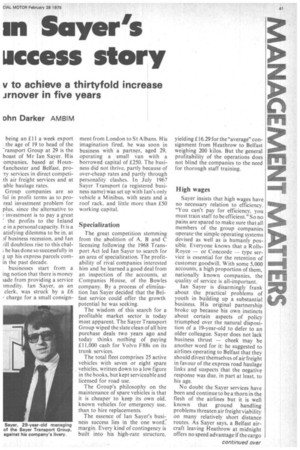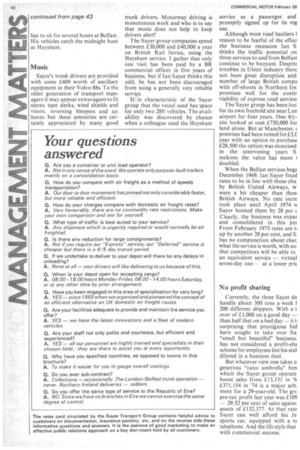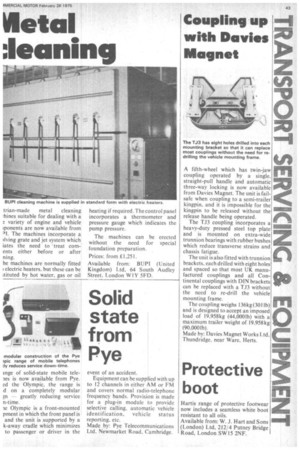in Sayer's Access story
Page 43

Page 44

Page 45

If you've noticed an error in this article please click here to report it so we can fix it.
v to achieve a thirtyfold increase Jrnover in five years
ohn Darker AMBIM
being an £11 a week export the age of 19 to head of the -ransport Group at 29 is the boast of Mr Ian Sayer. His !ompanies, based at Houn4anchester and Belfast. proTy services in direct competith air freight services and at .able haulage rates.
Group companies are so ful in profit terms as to proreal investment problem for plus, since the alternative to investment is to pay a great the profits to the Inland e in a personal capacity. It is a atisfying dilemma to be in, at )f business recession, and Ian /ill doubtless rise to this chal; he has done so successfully in g up his express parcels cornin the past decade.
businesses start from a ing notion that there is money Lade from providing a service lmodity. Ian Sayer, as an clerk, was struck by a £6 I charge for a small consign ment from London to St Albans. His imagination fired, he was soon in business with a partner, aged 29, operating a small van with a borrowed capital of £250. The business did not thrive, partly because of over-cheap rates and partly through personality clashes. In July 1967 Sayer Transport (a registered business name) was set up with Ian's only vehicle a Minibus, with seats and a roof rack, and little more than £50 working capital.
Specialization
The great competition stemming from the abolition of A, B and C licensing following the 1968 Trans port Act led Ian Sayer to search for an area of specialization. The profit ability of rival companies interested him and he learned a good deal from an inspection of the accounts, at Companies House, of the Bowles company. By a process of elimination Ian Sayer decided that the Belfast service could offer the growth potential he was seeking.
The wisdom of this search for a profitable market sector is today most apparent. The Sayer Transport Group wiped the slate clean of all hire purchase deals two years ago and today thinks nothing of paying £11,000 cash for Volvo F88s on its trunk services.
The total fleet comprises 25 active vehicles with seven or eight spare vehicles, written down to a low figure in the books, but kept serviceable and licensed for road use.
The Group's philosophy on the maintenance of spare vehicles is that it is cheaper to keep its own old, known vehicles for emergency use, than to hire replacements.
The essence of Ian Sayer's business success lies in the one word,, margin. Every kind of contingency is built into his high-rate structure, yielding £16.29 for the "average" consignment from Heathrow to Belfast weighing 200 kilos. But the 'general profitability of the operations does not blind the companies to the need for thorough staff training.
High wages
Sayer insists that high wages have no necessary relation to efficiency. "You can't pay for efficiency, you must train staff to be efficient." So no pains are spared to make sure that all members of the group companies operatethe simple operating systems devised as well as is humanly possible. Everyone knows that a RollsRoyce — or Concorde — type service is essential for the retention of customer goodwill. With some 5,000 accounts, a high proportion of them, nationally known companies, the quality of service is all-important.
Ian Sayer is disarmingly frank about the practical problems of youth in building up a substantial business. His original partnership broke up because his own instincts about certain aspects of policy triumphed over the natural disposition of a 19-year-old to defer to an older colleague. Sayer does not lack business thrust — cheek may be another word for it: he suggested to airlines operating to Belfast that they should divest themselves of air freight in favour of the express road haulage links and suspects that the negative response was due, in part at least, to his age.
No doubt the Sayer services have been and continue to be a thorn in the flesh of the airlines but it is well known that ground handling problems threaten air freight viability on many relatively short distance routes. As Sayer says, a Belfast aircraft leaving Heathrow at midnight offers no speed advantage if the cargo has to sit for several hours at Belfast. His vehicles catch the midnight boat at Heysham.
Music
Sayer's trunk drivers are provided with some £400 worth of ancillary equipment in their Volvo 88s. To the older generation of transport managers it may appear extravagant to fit stereo tape decks, wind shields and visors, reversing bleepers and air horns but these amenities are certainly appreciated by many good trunk drivers. Motorway driving is monotonous work and who is to say that music does not help to keep drivers alert?
The Sayer group companies spend between £30,000 and £40,000 a year on British Rail ferries, using the Heysham service. I gather that only one visit has been paid by a BR commercial officer in five years of business, but if Ian Sayer thinks this odd, he has not been discouraged from using a generally very reliable service.
It is characteristic of the Sayer group that the vessel used has space for only two 28ft vehicles. The availability was discovered by chance when a colleague used the Heysham service as a passenger and promptly signed up for its reg use.
Although most road hauliers I reason to be fearful of the effeci the business recession Ian S thinks the traffic potential on three services to and from Belfast continue to be buoyant. Despite troubles in Ulster industry there not been great disruption and number of large British compa with off-shoots in Northern Ire. promises well for the contir viability of express road servicei The Sayer group has been loo: for its own freehold site near Lon airport for four years. One 41,4site looked at cost £750,000 for land alone. But at Manchester, premises had been rented for£3,C year with an option to purchase £28,500 the option was exercised • in the intervening years S reckons the value has more 1 doubled.
When the Belfast services bega December 1969, Ian Sayer fixed rates to be in line with those cha: by British United Airways, w were a bit cheaper than thosi British Airways. No rate incre took place until April 1974 Sayer hoisted them by 28 per c Clearly, the business was expat and consolidated in. this per From February 1975 rates are ti up by another 28 per cent, and S. has no compunction about char, what the service is worth, with no that competitors will he able to an equivalent service — virtual seven-day one — at a lower pric
No profit sharing
Currently, the three Sayer de handle about 300 tons a week f 200 different shippers. With a t over of £1,000 on a good day — than half that on a had day — it i; surprising that prestigious bid have sought to take over Sa; "small but beautiful" business. has not considered a profit-sha scheme for employees lest his stab diluted in a business deal.
But whatever view one takes o generous "rates umbrella" ben which the Sayer group operate boost sales from £ 1 3,131 in '6 £371,154 in '74 is a major ach ment for a 29-year-old. The grc pre-tax profit last year was £109 — 29.52 per cent of sales agains assets of £132,377. At that rate Sayer can well afford his Je sports car, equipped with a ra telephone. And the life style that with commercial success. trian-made metal cleaning :hines suitable for dealing with a variety of engine and vehicle tponents are now available from 31. The machines incorporate a dying grate and jet system which iates the need to treat cornents either before or after fling.
he machines are normally fitted !electric heaters, but these can be ttituted by hot water, gas or oil
modular construction of the Pye vpic range of mobile telephones dy reduces service down-time.
trige of solid-state mobile teleles is now available from Pye. od the Olympic, the range is d on a completely modular ?,n — greatly reducing service n-time.
le Olympic is a front-mounted pment in which the front panel is and the unit is supported by a k-away cradle which minimizes to passenger or driver in the heating if required. The control panel incorporates a thermometer and pressure gauge which indicates the pump pressure.
The machines can be erected without the need for special foundation preparation.
Prices: from £1,25 I .
Available from: BU PI (United Kingdom) Ltd, 64 South Audley Street, 1.ondon W I Y 5FD.
event of an accident.
Equipment can he supplied with up to 12 channels in either AM or FM and covers normal radio-telephone frequency bands. Provision is made for a plug-in module to provide selective calling, automatic vehicle identification, vehicle status reporting, etc.
Made by: Pye Telecommunications Ltd, Newmarket Road, Cambridge.




























































































